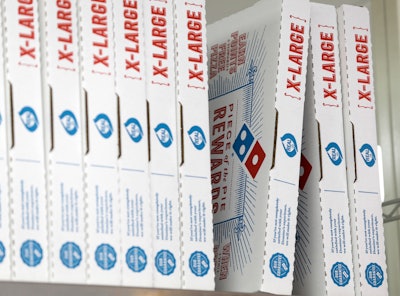
ANN ARBOR, Michigan (AP) — Domino's Pizza, Inc.'s first quarter earnings beat overshadowed investor's concerns about slowing growth at the world's biggest pizza chain. Domino's net income rose 4.4 percent to $92.7 million, or $2.20 per share. That beat Wall Street's forecast of $2.09, according to analysts polled by FactSet.
The Ann Arbor-based company cited higher royalties from franchisees, improved margins and a lower-than-expected tax rate contributed to the increase, Maxim Group analyst Stephen Anderson said in a note to investors. Domino's shares jumped nine percent to $294.87 in morning trading Wednesday.
Still, Domino's fell short of sales forecasts. Revenue rose 6.4 percent to $836 million, lower than the $850 million analysts expected. Sales at U.S. stores open at least a year rose 3.9 percent in the January-March period. That was down from 8.3 percent a year ago, and short of Wall Street's forecast of 4.9 percent. International same-store sales rose 1.5 percent, down from five percent a year ago.
Domino's CEO Ritch Allison said the company was unhappy with those numbers. Softness in some European and Pacific markets and a big marketing push by third-party delivery services like UberEats during the NCAA basketball tournament hurt business during the quarter, he said.
Domino's is fighting back with its "fortressing" strategy, building more locations so deliveries arrive faster. Domino's opened 200 net new stores during the first quarter, the fastest pace in six quarters, Anderson said. That hurts same-store sales in the short term as business shifts to new stores, but could increase sales in the long term. Domino's now has 16,000 stores worldwide.
Allison reiterated that the company won't work with third-party delivery services, even though low unemployment and higher minimum wage laws in cities like Seattle are raising the cost of delivery drivers. Allison said third parties cut into restaurant profits and collect valuable data. "I'd have a tough time sleeping at night if I was handing our food to an untrained driver," he said.




















